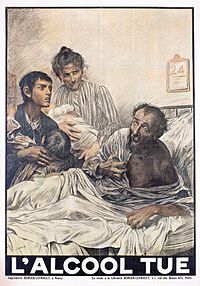
Photo from wikipedia
Background: The hyperactive subtype of delirium is characterized by agitation, restlessness, delusions, and/or hallucinations, which commonly present near end of life (EoL). Symptom relief often requires the use of medications,… Click to show full abstract
Background: The hyperactive subtype of delirium is characterized by agitation, restlessness, delusions, and/or hallucinations, which commonly present near end of life (EoL). Symptom relief often requires the use of medications, such as chlorpromazine (CPZ), to reduce patient distress by inducing proportional sedation. Objective: The purpose of this study was to evaluate CPZ's potential role in managing the distress of hyperactive delirium in patients receiving EoL care. Methods: A retrospective observational study among hospitalized patients with advanced cancer at EoL between January 2020 to December 2021. Results: Sustained improvement in symptoms of delirium was seen in 80% of patients as identified in the palliative psychiatrist's progress notes. Meanwhile, 75% of patient's improvement was reported in nursing-driven Delirium Observation Screening Scale. Conclusion: This study elucidates that at doses of ∼100 mg/day, CPZ is potentially an effective medication for patients with advanced cancer, experiencing hyperactive delirium in their final week of life.
Journal Title: Journal of palliative medicine
Year Published: 2023
Link to full text (if available)
Share on Social Media: Sign Up to like & get
recommendations!